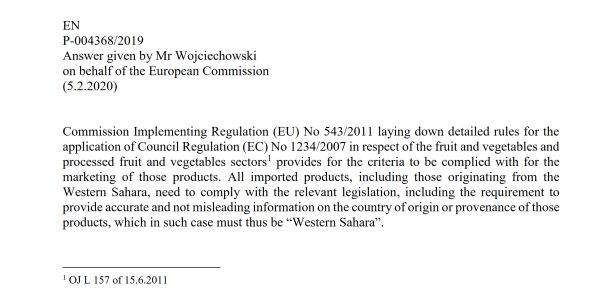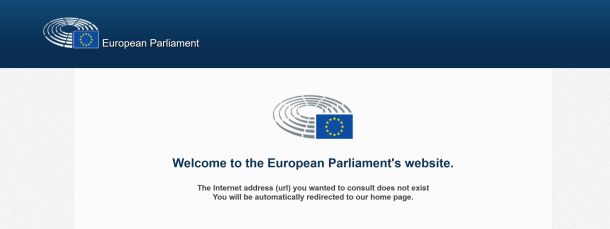
The leading MEP on the proposal to extend EU-Morocco trade relations into occupied Western Sahara wants a legal opinion to be certain the proposed Western Sahara trade scheme meets the standards of the highest EU Court. The European Parliament is to vote this afternoon.
"Asking for a legal opinion does not mean we implicitly reject the Council decision or do not wish to cherish and maintain the close ties we have with our partner Morocco. Instead, it reaffirms the value the European Parliament attaches to core principles of international law", Marietjes Schaake wrote this morning, explaining her position as the European Parliament's rapporteur on the proposal to extend EU-Morocco trade relations into the part of Western Sahara that is occupied by Morocco.
Schaake also explains that potential economic benefits of such an agreement - provided it complies with EU law - must be extended to all living in Western Sahara, including the part that is not controlled by Morocco, "without discrimination and without prejudice to the right of self-determination of the Sahawari people. That is why I, on behalf of my group tabled an amendment asking the European Commission to work towards also extending trade preferences to that part of the Western Sahara not administered by Morocco".
Read Schaake's full explanation on her own website here [or download].
Marietje Schaake has been Rapporteur on the file since 10 December 2018, after her predecessor, French liberal Patricia Lalonde, resigned after EU media had discovered she was an active board member of a lobby-group working for Morocco.
Schaake has built a reputation as staunch supporter of rule-of-law and respect for human rights.
In December 2016, the EU Court of Justice ruled that no EU-Morocco Trade or Association Agreement could be applied to occupied Western Sahara. Morocco has no sovereignty over the territory, or an international mandate to administer it, the Court explained. An EU agreement with Morocco could thus only lawfully affect the territory with the explicit consent of its people.
The proposal that Parliament will vote on this afternoon, does not have the consent of the people of Western Sahara. They were never asked whether they want the EU-Morocco trade relations to be extended into the part of their land that Morocco illegally occupies. The EU Commission simply negotiated the inclusion of the occupied territory with Morocco, ignoring the Saharawis completely. Nevertheless, the EU Commission claims it does not recognize Morocco's self-proclaimed sovereignty over Western Sahara and that the proposal will resort positive effects on the UN peace process.
EU Commission backtracks on labelling Western Sahara goods
What is EU's position on labelling of products from occupied Western Sahara? The EU Commission has now for the third time published a response to a parliamentary question on the matter, but the latest version fails to address the question.
Why does this EU statement keep disappearing?
A clarification by the EU Commission on labelling of products from Western Sahara was published, then removed, then published again and has now been removed again from EU websites.
EU reaffirms: Western Sahara products to be labelled as such
Two weeks ago, the EU Commission announced that products from Western Sahara should be labelled accordingly, only to withdraw that statement the very next day. Today, the Commission reaffirms its original position.
Spectacular backtracking by EU Commission on Western Sahara labelling
On 5 February 2020, the EU Commission announced that products from Western Sahara should be labelled accordingly. But about 24 hours later, all traces to that statement had been removed from EU websites.



